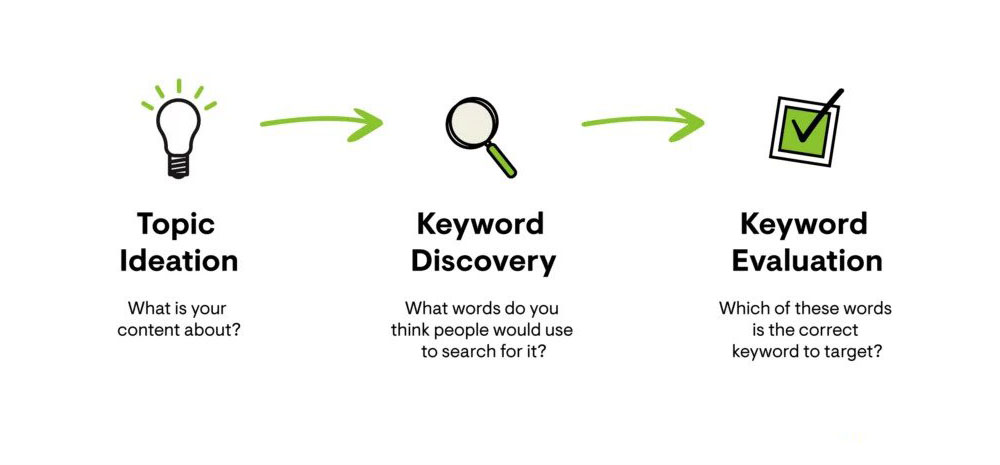Keyword research is a critical component of Search Engine Optimization(SEO). Knowing why keyword research is useful for SEO and how to rankis one of the primary ways to be successful in the digital platform.
By understanding the importance of keyword research and implementing effective strategies, you can enhance your website's visibility, attract targeted traffic, and improve your chances of ranking higher in search engineresults. Here, we will explore the significance of keyword research for SEOand provide practical tips on how torank higher in search engine rankings.
Why Keyword Research Is Useful For Seo And How To Rank
Keyword research serves as the foundation of your SEO strategy. It involves identifying the specific words and phrases that people use when searching for information online. By conducting thorough keyword research, you can gain valuable insights into your target audience's search behavior, align your contentwith their needs, and drive organic traffic to your website. Here are some reasons why keyword research is essential for SEO:
Understanding User Intent
Effective keyword research goes beyond identifying relevant keywords. It also involves understanding user intent, which refers to the underlying purpose behind a search query. By analyzing user intent, you can align your content with what your target audience is looking for and provide them with valuable information or solutions.
For example, if you're running a fitness blog and find that users are searching for "how to lose belly fat," you can create content that specifically addresses this query. By understanding the intent behind the search, you can tailor your content to provide actionable tips, exercise routines, and diet suggestions to help users achieve their goals.
Targeting The Right Keywords
Keyword research helps you identify the keywords and phrases that are most relevant to your businessor website. By targeting the right keywords, you can attract users who are actively searching for products, services, or information related to your niche. This targeted traffic has a higher chance of converting into leads or customers.
It's important to strike a balance between search volume and competition when selecting keywords. High-volume keywords may attract more traffic, but they often face stiff competition. On the other hand, long-tail keywords (more specific and longer phrases) have lower search volumes but are usually less competitive. By targeting a mix of high-volume and long-tail keywords, you can maximize your chances of ranking well in search results and attracting relevant traffic.
Optimizing Your Content
Keyword research is crucial for optimizing your website's content. By incorporating targeted keywords into your content strategically, you can signal to search engines that your website is relevant to specific search queries. Here are some key areas to optimize with your chosen keywords:
- Page Titles and Headings -Include your primary keywords in the title tagsof your web pages and use relevant headings (H1, H2, etc.) to structure your content.
- URLs -Optimize your URLs by including targeted keywords. This not only helps search engines understand the content but also makes your URLs more user-friendly.
- Content Body -Naturally incorporate keywords throughout your content, ensuring that it flows organically and provides value to your readers.
- Meta Descriptions-Write compelling meta descriptionsthat include relevant keywords, as these are often displayed in search engine snippets.
However, it's crucial to avoid keyword stuffing, which refers to the excessive and unnatural use of keywords in an attempt to manipulate search rankings. Keyword stuffing can result in penalties from search engines and harm your website's visibility. Instead, focus on creating high-quality, informative content that incorporates keywords naturally.

My Favorite Keyword Research Strategy
How To Conduct Effective Keyword Research In 7 Ways
Now that we understand the significance of keyword research, let's dive into the steps involved in conducting effective keyword research:
1. Begin With Seed Keywords
Start by brainstorming a list of seed keywords that are relevant to your businessor website. These are general keywords that represent the main topics or themes you want to rank for. For example, if you have an online shoe store, your seed keywords could be "running shoes," "athletic footwear," or "comfortable sneakers."
2. Expand Your Keyword List
Use keyword research tools like Google Keyword Planner, SEMrush, or Ahrefs to expand your keyword list. Enter your seed keywords into these tools and explore the suggested keywords they generate. Look for keywords that have a good balance of search volume and competition.
Additionally, leverage the "Related Searches" or "People Also Ask" sections in search engine results pages to discover related keywords and phrases that people are searching for. This can help you uncover long-tail keywords and identify specific topics to create content around.
3. Analyze Keyword Metrics
Once you have a comprehensive list of keywords, analyze their metrics to prioritize them. Consider factors like search volume, competition level, and relevance to your target audience. Tools like Google Keyword Planner can provide insights into these metrics.
Focus on keywords with a moderate to high search volume that is relevant to your website. Look for keywords with lower competition to increase your chances of ranking well. Long-tail keywords can be particularly valuable as they often indicate higher user intent and lower competition.
4. Consider User Intent And Context
While analyzing keywords, it's crucial to understand user intent and the context behind each search query. User intent falls into several categories, including informational, navigational, transactional, and commercial investigation. By aligning your content with the user's intent, you can better satisfy their needs and improve your chances of ranking higher.
For example, if a user searches for "best budget running shoes," they are likely in the commercial investigation stage, comparing different options before making a purchase. By creating content that reviews and compares budget running shoes, you can provide valuable information to the user and increase the likelihood of them choosing your products.
5. Monitor And Refine Your Strategy
Keyword research is an ongoing process that requires monitoring and refinement. Regularly track the performance of your keywords, including rankings, organic traffic, and conversions. Tools like Google Analyticscan provide valuable data on how users are finding your website and which keywords are driving the most traffic.
Several tools can assist you in monitoring keyword performance. Google Search Console, for instance, provides valuable insights into the keywords that drive traffic to your website, as well as their rankings and click-through rates. Additionally, SEOplatforms like SEMrush and Ahrefs offer robust tracking features to monitor keyword positions and analyze changes in rankings.
Regularly reviewing keyword performance allows you to identify opportunities for improvement. If certain keywords are underperforming, consider adjusting your content strategyto better align with user intent or explore alternative keywords that may yield better results. On the other hand, if specific keywords are driving significant traffic and conversions, you can optimize your content further to maximize their potential.
Keep an eye on your competitors and their keyword strategies as well. By analyzing their keyword choices and rankings, you can identify new opportunities or adjust your strategy to gain a competitive edge.
6. Leveraging Long-Tail Keywords
In addition to targeting broader keywords, it's essential to leverage long-tail keywords in your SEO strategy. Long-tail keywords are longer and more specific phrases that tend to have lower search volume but higher conversion potential. While they may individually drive less traffic, their specificity makes them valuable in attracting highly targeted visitors who are more likely to convert.
To find effective long-tail keywords, consider using keyword research tools like SEMrush, Ahrefs, or Google Trends. These tools can provide insights into specific keyword variations and search volumes. Long-tail keywords often include descriptive terms, location-specific modifiers, or specific product or service features.
For example, instead of targeting the broad keyword "running shoes," consider incorporating long-tail keywords like "best women's running shoes for trail running" or "affordable lightweight running shoes for beginners." These specific phrases indicate clear user intent and can help you reach a more focused audience.
When optimizing your content with long-tail keywords, ensure that they are naturally integrated into your headings, subheadings, and body text. By providing valuable, in-depth content that addresses specific user queries, you increase the chances of ranking well for relevant long-tail keywords and attracting targeted organic traffic.

Long Tail Keyword Mastery Guide: Find the Best Keywords To Rank #1
7. Staying Updated With Keyword Trends
The digital landscape is dynamic, with search trends and user behaviors constantly evolving. To maintain a competitive edge, it's essential to stay updated with the latest keyword trends and adapt your SEO strategy accordingly.
Keep an eye on industry news, blogs, and forums related to your niche to identify emerging topics and keyword opportunities. Tools like Google Trends can provide valuable insights into the popularity and seasonality of keywords, allowing you to adjust your content strategy accordingly. By addressing trending topics and incorporating relevant keywords, you can increase your chances of capturing the attention of your target audience and driving more organic traffic.
Additionally, staying updated with changes in search engine algorithms and ranking factors can help you refine your SEO strategy. Major search engines like Google regularly update their algorithms to deliver more relevant and user-friendly search results. By staying informed about these updates, you can ensure that your website complies with the latest SEO best practices and maintains its visibility in search engine rankings.
People Also Ask
Which Is Most Important To Rank A Page On SEO?
Top Page Ranking Factors in SEO:
- High-quality content
- Keyword placement
- Image optimization
- Niche expertise
What Are The Most Important Ranking Factors For SEO?
When it comes to SEO, certain factors play a significant role in determining your website's ranking on Google. Here are the most important ranking factors you should focus on:
- High-quality content
- Mobile-first design
- Page experience
- Page speed
- On-page optimization
- Internal links
- External links
Why Keyword Ranking Is Important?
Keyword ranking is crucial because it determines how visible your website is in search engine results. When your website ranks higher for specific keywords, it receives more organic search traffic. Studies show that the top three organic results capture about 75.1% of all clicks, with the top-ranking page alone receiving 31.73% of clicks. Therefore, aiming for higher keyword rankings can significantly increase your website's chances of attracting valuable organic traffic.
Conclusion
Knowing why keyword research is useful for SEO and how to rank helps you optimize your website's content, attract targeted traffic, and rank higher in search engine results. By understanding user intent, targeting the right keywords, and optimizing your content effectively, you can increase your website's visibility and improve your chances of success online.
Invest time and effort into conducting thorough keyword research, and you'll reap the rewards of higher visibility, increased organic traffic, and better overall performance for your website. Start implementing these strategies today and witness the positive impact on your SEO results.
Remember that keyword research is an ongoing process, and it requires continuous evaluation and adjustment.
